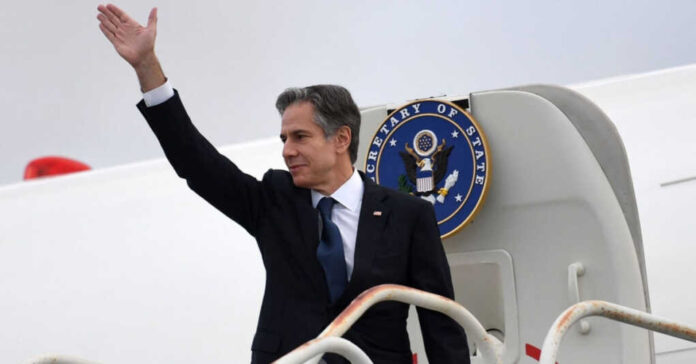
“Hell of a job” was President Joe Biden’s response to Secretary of State Antony Blinken’s recent diplomatic visit to China and subsequent meetings with Chinese President Xi Jinping and other officials. The highlight of the visit was reassurances that, if China invades Taiwan, the U.S. will not get in the way.
During the visit, Blinken questioned Xi about his “provocative actions in the Taiwan Strait, as well as in the South and East China Seas” while reiterating that the longstanding U.S. “one China” policy has not changed.
“We do not support Taiwan independence,” Blinken assured Xi. “We remain opposed to any unilateral changes to the status quo by either side. We continue to expect the peaceful resolution of cross-strait differences.”
In May 2023, the United States State Department changed its website about Taiwan, removing references that acknowledged Beijing’s claims that Taiwan is part of China as well as verbiage stating that the U.S. did not support Taiwan’s independence.
Beijing was not happy with the changes. China’s Foreign Ministry accused the U.S. of political manipulation, adding that the tactic will not change the status quo over the island. Chinese Foreign Ministry spokesman Zhao Lijian added that the changes were “a petty act of fictionalizing and hollowing out the one-China principle.” Xi threatened, “This kind of political manipulation on the Taiwan question is an attempt to change the status quo in the Taiwan Strait and will inevitably stir up a fire that only burns the United States.”
The US State Department quickly revised the information following Blinken’s recent China visit and subsequent tossing of Taiwan under the proverbial bus. The website was edited again to add the missing information. The phrase, “We do not support Taiwan independence,” was once again included.
Both China and Taiwan can be forgiven for having no idea where President Joe Biden stands. In November 2021, Biden had to reassure China that the U.S. did not encourage independence for Taiwan following remarks a month prior that he would come to Taiwan’s defense if China attacked the island.
But with billions of dollars sent to support Ukraine in its attack on Russia, what makes the US support one and not the other? Both Russia and China seek reunification, so why is Biden so eager to make it clear that Taiwan, with its 23 million people, can pound sand if China invades?
It’s a question rooted in historical connections, economic interests, and fears of disturbing, as China so aptly worded it, the “status quo.”
First, The United States adheres to the One China policy, which recognizes the People’s Republic of China (PRC) as the legitimate government of China. This policy was established in 1979 when the U.S. switched its diplomatic recognition from Taiwan to the PRC. Under the One China policy, the U.S. does not officially recognize Taiwan as a sovereign state.
The U.S. fears that recognizing Taiwan as an independent country could potentially disrupt the delicate balance of power between the PRC and Taiwan, which could lead to regional instability and conflict. The U.S. seeks to maintain peaceful relations and avoid escalation in the region.
It’s also a question of money. The United States has significant economic and trade interests with both China and Taiwan. China is one of the largest trading partners of the U.S., and many American companies have investments in China. Supporting Taiwan’s independence could strain the economic relationship with China and have adverse effects on trade.
And lastly, Taiwan is strategically located in the western Pacific and holds geopolitical significance. The U.S. maintains unofficial relations with Taiwan and supports its self-defense capabilities through arms sales in accordance with the Taiwan Relations Act. This allows the U.S. to help maintain stability and deter any potential aggression from the PRC without explicitly supporting independence.
In short, the United States is in the unenviable position of supplying Taiwan with weaponry necessary for defense while “not supporting” its independence and ticking off China.
Despite Biden’s praise of Blinken’s visit, nothing has changed. Robert Daly, director of the Wilson Center’s Kissinger Institute on China, noted: “Neither country’s threat assessments are going down. They haven’t changed their threat assessments. We haven’t changed our intentions. We haven’t changed our tactics.”
He went on to add, “These dialogues are terrific, the more of them we have, the better — but there is no sign to date that either side is really changing any of its assessments of itself of the other.”
The visit ended with a “don’t call us, we’ll call you” and vague promises of future meetings to come, probably with the same lack of results.
The precarious position the U.S. finds itself in is a dizzying situation for someone who can remember to tie his shoes in the morning, much less for the current administration. It requires a delicate balancing act…from someone who tripped over a sandbag on a stage.







